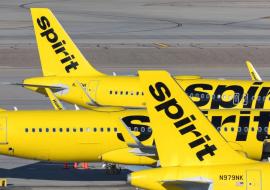Low-cost Carriers’ Domestic Market Share Continues to Rise


Six years ago, JP Morgan analysts predicted that low-cost carriers “will eventually inherit the Earth.” It’s a big planet. But low-cost carriers are certainly taking an ever-larger share of the U.S. domestic market.
And while they might not yet be the masters of the universe that the financial gurus prophesied, a Travel Weekly analysis of Transportation Department data reveals that low-cost carriers continue to grab domestic market share as legacy airlines focus ever-greater attention on international routes.
Industry analysts predict that the shift to low-cost carriers should dominate the industry for some time, but especially for the duration of the Great Recession. As a result, they predict, passengers will benefit with lower base airfares while carriers struggle with lower yields.
“The LCCs have had an incredible impact in terms of costs and fares and at the same time are putting the fear of God in the legacy carriers’ hearts,” analyst Darryl Jenkins of the aviation industry economic website the Airline Zone said of low-cost carriers.
Gradually but steadily, the low-cost carriers gained ground through the rest of the decade, with those airlines garnering 26 percent domestic market share by August of this year, the analysis shows.
That excess baggage includes high debt and labor costs, he said. “After they emerged from bankruptcies, even though they had lower debt and lower labor costs, they still had overleveraged balanced sheets.”
While airlines were able to secure higher fares to help them survive the 2008 oil price hike, the subsequent recession and accompanying drop in demand have led to deep discounts and fare promotions.
There is a dark side to that growth, however. When the recession spread around the globe, cutting especially deeply into international corporate travel, the legacy airlines’ increased reliance on those routes put them at greater risk.
“Our large Pacific presence has been particularly vulnerable in this recession,” United President John Tague told analysts in October. “A high exposure to business and premium traffic made us more susceptible to reductions in corporate travel spending.”
Legacy carriers take heart in fare increases that airlines have been able to impose in the latter part of this year and through the holidays, thanks to the capacity cutbacks most carriers have implemented to counter a recession-driven drop in demand.
But most analysts predict airfares will, on average, continue to stay low or even drop as the low-cost carriers continue to break into more markets and expand their geographic reach.














